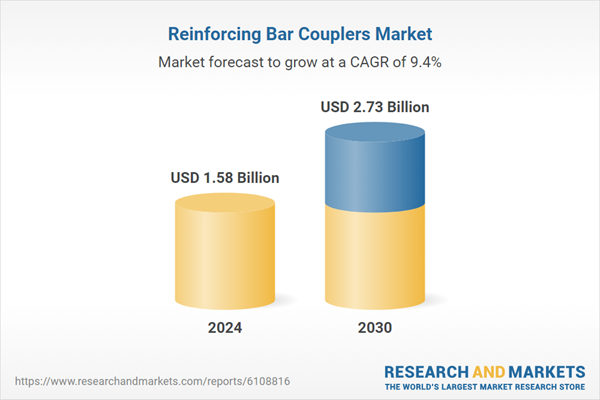Speak directly to the analyst to clarify any post sales queries you may have.
10% Free customizationThis report comes with 10% free customization, enabling you to add data that meets your specific business needs.
Key Market Drivers
Infrastructure Modernization and Urbanization Projects Across Developing Economies
Rapid urbanization and the rollout of expansive infrastructure programs in developing regions are propelling demand for reinforcing bar couplers. Countries across Asia-Pacific, the Middle East, Africa, and Latin America are prioritizing the development of transportation networks, energy facilities, urban housing, and smart city projects. Reinforcing bar couplers are increasingly replacing conventional lap splicing in these settings due to their efficiency, structural integrity, and ability to support high-load applications. These connectors streamline the reinforcement process, reduce rebar congestion, and accelerate project timelines - factors that are essential for modern infrastructure projects operating under tight deadlines and rigorous safety codes. As these economies continue to modernize, reinforcing bar couplers are becoming a preferred solution for high-performance concrete structures.Key Market Challenges
High Initial Costs and Low Adoption in Emerging Economies
Despite their technical advantages, reinforcing bar couplers face adoption challenges in cost-sensitive markets. The upfront investment in mechanical splicing systems - including couplers, specialized tools, and skilled labor - can be prohibitive for small-scale contractors and projects with limited budgets. While couplers reduce long-term costs through durability and faster construction, the initial capital expenditure often deters builders in emerging economies from adopting them. Additionally, a lack of trained workforce and low awareness of coupler benefits contributes to the continued reliance on traditional lapping methods, which require less expertise and infrastructure, though at the expense of efficiency and structural optimization.Key Market Trends
Sustainability and Eco Efficient Coupler Manufacturing
A major trend reshaping the reinforcing bar couplers market is the integration of sustainability into manufacturing practices and product development. In response to global climate goals and green building standards such as LEED and BREEAM, manufacturers are increasingly utilizing recycled steel, energy-efficient production techniques, and environmentally responsible packaging. These advancements not only reduce the carbon footprint but also enhance product lifecycle performance and recyclability.Clients - particularly in North America, Europe, and Asia-Pacific - are demonstrating a growing preference for low-carbon, certified coupler systems, often paying premium prices for verified eco-friendly products. Certifications such as Environmental Product Declarations (EPDs) and ISO 14001 are becoming essential for participation in public tenders and large-scale infrastructure projects. As sustainability becomes a central procurement criterion, manufacturers are leveraging green innovations as a competitive differentiator across global markets.
Key Market Players
- Dextra Group
- Halfen Moment Group
- BarSplice Products, Inc.
- LENTON (nVent)
- TMG Global Pte Ltd
- Tokyo Tekko Co., Ltd.
- Peikko Group
- Terwa B.V.
- Ancon Ltd (a CRH company)
- Sika AG
Report Scope:
In this report, the Global Reinforcing Bar Couplers Market has been segmented into the following categories, in addition to the industry trends which have also been detailed below:Reinforcing Bar Couplers Market, By Product:
- Grout Sleeve
- Parallel Thread Standard Bar
- MBT
- Tapered Thread Bar Couplers
Reinforcing Bar Couplers Market, By Application:
- Building Construction
- High Bridge Construction
- Others
Reinforcing Bar Couplers Market, By Region:
- North America
- United States
- Canada
- Mexico
- Europe
- France
- United Kingdom
- Italy
- Germany
- Spain
- Asia-Pacific
- China
- India
- Japan
- Australia
- South Korea
- South America
- Brazil
- Argentina
- Colombia
- Middle East & Africa
- South Africa
- Saudi Arabia
- UAE
- Kuwait
- Turkey
Competitive Landscape
Company Profiles: Detailed analysis of the major companies present in the Global Reinforcing Bar Couplers Market.Available Customizations:
With the given market data, the publisher offers customizations according to a company's specific needs. The following customization options are available for the report.Company Information
- Detailed analysis and profiling of additional market players (up to five).
This product will be delivered within 1-3 business days.
Table of Contents
Companies Mentioned
- Dextra Group
- Halfen Moment Group
- BarSplice Products, Inc.
- LENTON (nVent)
- TMG Global Pte Ltd
- Tokyo Tekko Co., Ltd.
- Peikko Group
- Terwa B.V.
- Ancon Ltd (a CRH company)
- Sika AG
Table Information
| Report Attribute | Details |
|---|---|
| No. of Pages | 180 |
| Published | July 2025 |
| Forecast Period | 2024 - 2030 |
| Estimated Market Value ( USD | $ 1.58 Billion |
| Forecasted Market Value ( USD | $ 2.73 Billion |
| Compound Annual Growth Rate | 9.3% |
| Regions Covered | Global |
| No. of Companies Mentioned | 10 |









